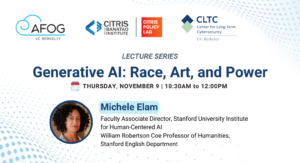- This event has passed.
About this event
From ChatGPT, DALL-E, Bard, and Midjourney, the use of AI as a creative tool has increased dramatically both from technological breakthroughs and a flood of new users. Users and researchers have offered both praise and criticism – about the veracity of AI-generated art, race and gender bias engrained in these systems, and the exploitation of work from marginalized groups within training data.
Join three dynamic experts to expand on these themes and to facilitate discussions about generative AI and its effects at the intersections of race, art, and power.
Sessions will explore questions such as:
- Who suffers most when it comes to the potential replacement of working artists and writers?
- How is knowledge created through the use of generative AI? Whose work gets to be remembered?
- Who speaks and who listens; who is at the table when it comes to conversations surrounding art and generative AI?
- Is AI-generated art high-art or low-art? Can it be considered “art” at all? What can be considered creativity?
- What does the future landscape look like for activism in the problem space of generative AI?
Co-sponsored by:
- Algorithmic Fairness and Opacity Group
- AI Security Initiative
- Center for Long-Term Cybersecurity
- CITRIS Policy Lab
Thursday, November 9 | 10:30am to 12:00pm
Michele Elam is the William Robertson Coe Professor of Humanities in the English Department at Stanford University, a Faculty Associate Director of the Institute for Human-Centered Artificial Intelligence and a Race & Technology Affiliate at the Center for Comparative Studies in Race and Ethnicity
Elam’s research in interdisciplinary humanities connects literature and the social sciences in order to examine changing cultural interpretations of gender and race. Her work is informed by the understanding that racial perception in particular impacts outcomes for health, wealth and social justice. More recently, her scholarship examines intersections of race, technology and the arts. “Making Race in the Age of AI,” her most recent book project, considers how the humanities and arts function as key crucibles through which to frame and address urgent social questions about equity in emergent technologies.
Accessibility Accommodations
If you require an accommodation for effective communication (ASL interpreting, CART captioning, alternative media formats, etc.) or information about mobility access in order to fully participate in this event, please contact Rachel Wesen at cltcevents@berkeley.edu with as much advance notice as possible and at least 7–10 days in advance of the event.







